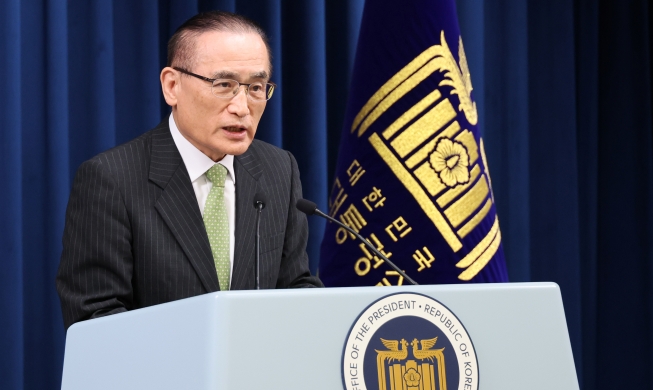This legend ironically reminds us of the importance of communication. As the population grows and civilization develops, the diversity of culture deepens further. As such, the complexness of languages increases. To facilitate dialogue and communication among humans and cultures in a smoother manner, “translation” inevitably comes forward.
Translation introduces various cultures to us and makes our culture more abundant. It is impossible to explain the development of civilization and that of history without translation because it connects the cultures of humans who live in different parts of the world and expands the range of life. Today, the role of translation is the same. Its importance and value are considered much higher. Every year, there are many newly translated books that appear on bookshop shelves. This proves that the demand for other cultures, information and knowledge is getting stronger.
It goes without saying how important translation is to world literature. All literary works we encounter in our daily routine, such as poems, novels and essays, undergo a process of communication and translation over a long period of time. Exchanges and communication through literature clearly differ themselves from political or economic relations, which depend on an individual’s interest in gain or loss. It goes beyond mere economic relationship to touch human emotion, which leads to a level of high-quality cultural exchange that boosts trust and friendship.
The Literature Translation Institute of Korea (LTI Korea) was established in 2001 to expand cultural exchanges through translation, and to contribute to world culture. The organization is headed by Kim Seong-kon, an English literature scholar and literature critic. Korea.net sat down with him to talk about the meaning and role of translation in today’s world, where the boundaries of everything are diminishing and becoming one.
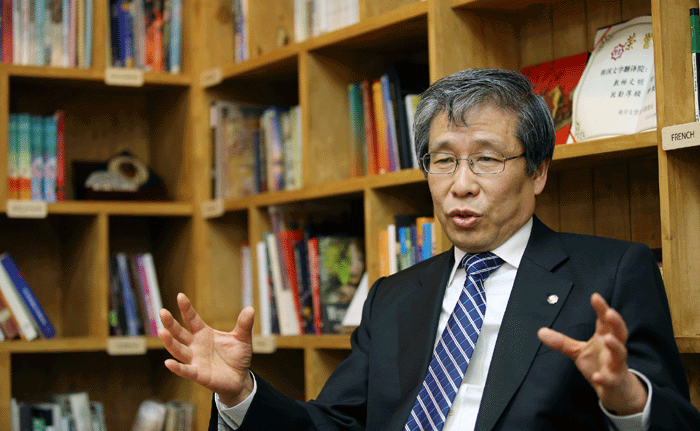
LTI Korea President Kim Seong-kon explains the meaning of translation, while saying that our lives themselves can be seen as translations.
- You translated “The Square” by Choi In-hun into English last year. What reaction was there to the novel?
Many reviews can be seen online. A lot of readers found it interesting and felt the desperation. I think it is because of Korea’s unique situation of being in a ceasefire, with the war not formally ended. This novel was originally written in the 1960s. What impressed me most is that the writer chose a third way, instead of choosing either the left or the right. I realized that a great writer never chooses one side, but looks for a third direction. Many writers, however, do not encompass the two ideologies and find a third way by reconciling both of them. They would rather choose an easier way: settling. I believe that this is a task they need to overcome.
They need to tolerate, but not be hostile to, those who are different from them. This is a grave task for all literary circles and the overall artistic community, as well.
- On one hand, the historic background of the Renaissance or the modernization which Korea underwent cannot be explained without translation. The process of translating the Greek and Rome classics into Italian, from Arabic, brought about the Renaissance. Translation also enabled the modernization of Korea through the tool of translation, which delivered Western learning to Korea. Translation can be seen as a messenger that connects different cultures. What does translation mean today in the 21st century?
We see it this way. Our lives themselves can be seen as translations in some ways. In other words, we accept communication between individuals through a sort of translation. We look at the facial expressions of a person. We interpret their words to understand their message. I reckon translation is inevitable. Umberto Eco, who teaches translation at the University of Bologna in Italy, thought that everything -- music and arts and not to mention literature -- involved translation. These are the characteristics of translation studies. When we see a painting, what we see may be different from what French people see, for example. We all accept the painting in a different way through a cultural translation without noticing it. Seeing everything as a translation is important.
Secondly, translation is never inferior to the original version. In the preface of “The Name of the Rose,” Eco said that the book is not an original work but a triple translation. It was firstly translated into Latin by a monk of the 14th century, and then translated by French priests into French in the 19th century. This was again translated into Italian in the late 20th century. This is because, in my view, he wanted to say that a translation is never inferior to the original. In the end, all that we write is another form of translation which the ancestors used.
In some sense, the arts and music are universal languages which people can accept without translation. Literature, however, is not the same. It takes a long time to transfer the content into another language. It is difficult as it is often changed in the translation process. Theories today say translation does not have to be the same as the original. Translation is another form of creation. It is as hard as creation.
We have 25 professors in the LTI Korea’s Translation Academy course. I found it interesting when a Spanish professor there said, “A translation is to un-build a house, load its materials on a boat, cross the ocean and build a similar house on a different shore. As the old house was demolished, the new one cannot be the same. It does not need to be the same. Translation is like making a new house that suits the air of the shore." I agree with him. I think this is the essence of translation. He also said that, "In order to produce a good translation, one needs to consider the original, previous text with affection when translating, just like a soldier who cherishes a letter from his loved one." If you wish to make money through translation, you will never produce an excellent translation. To translate well, people need to have three basic requirements. First, they need to have a mastery of the language and the culture. If they do not understand the culture, this will cause a mistranslation. Second, they need to have a literary sense and, finally, great writing ability is essential.
- The LTI Korea was established in 2001. Since then, what have been some of its landmark successes?
In the past, French and German translations took a large part of our efforts, but English accounted for a relatively smaller portion. After I became LTI Korea president, I built a network with English literature scholars, professors of Korean literature and other experts. I formed a team for English with [Korean] members who could speak English as fluently as a native speaker. We made a contract with Dalkey Archive Press in the U.S. to publish a 25-volume series of Korean literature, titled, "The Library of Korean Literature.”So far, we've published 15 books.
To reflect the trends of the time, we also made an e-book team and produced 30 books. We have been introducing Korean writers, in cooperation with Amazon Crossing, an e-book company that is part of Amazon.com. Among them is Suah Bae's “Highway with Green Apples” which was published in Amazon’s Day One, a digital literary journal put out by Amazon Publishing with a run of about 20,000 copies. Some of the books which won popularity were later printed as a physical book in New York. Bae’s works were included in the series of world literature.
The LTI Korea also developed an application that enables users to read Korean literature through their smartphone. We provide data about some 350 Korean writers, including Shin Kyung-sook, at Wikipedia in both English and French. In the past, when Korean writers published their books overseas, even the English spelling of their name was different in different locations. For example, in the case of Yi Mun-yol, we found 12 different spellings for his name. We built a database to unify such differences by asking the authors which Romanization they preferred, in order to provide unified information online. We opened an e-library this month. Now, when we type the name of a Korean writer in English, we can see all the related information about them from across the world.
- It is noticeable that the LTI Korea has been hosting a series of international events, such as the Seoul International Writers Festival and international book fairs in 11 countries, helping Korean literature to exchange with the world. What outcome do you expect, though it must be a long-term view?
For the Seoul International Writers Festival, we organized a residence program in which we coupled each of the 14 non-Korean authors with a Korean writer to spend one week together. They became close and even learned each other's foreign language. After the program, they went back home and introduced Korean novels and even invited Korean authors to their countries. I believe such exchanges are quite important.
Program participants will read the works of their partner. They visit the streets of Seoul, like Dongsung-dong, to boost their understanding about the city. We've been aiming to globalize such a network. Through these events, I believe, we have been doing an important job of facilitating exchanges among authors. In fact, exchanges between Korean and non-Korean writers are important to introduce Korean writers overseas.
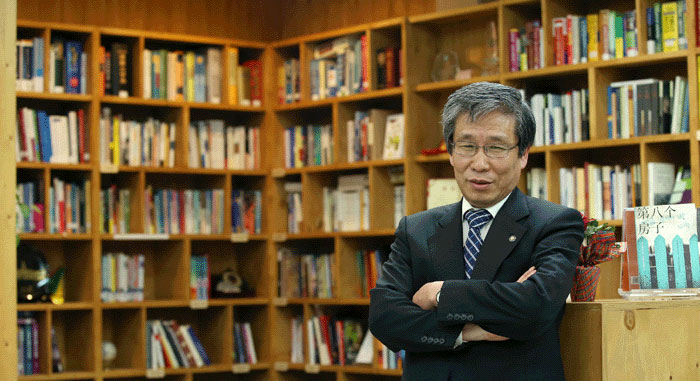
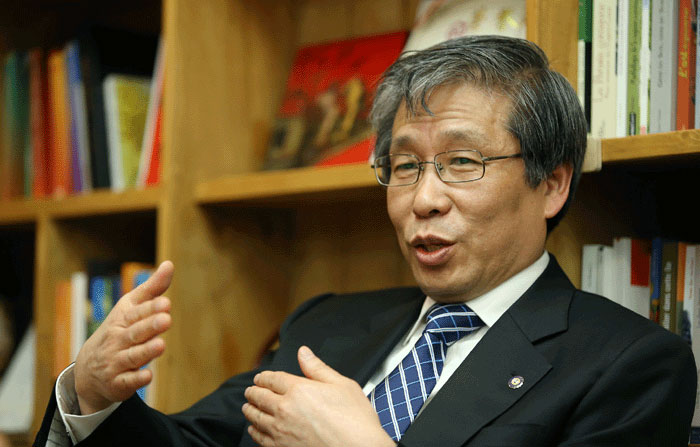
Kim Seong-kon says the prerequisite for a good translation is to have mastery of both the language and the culture, a good literary sense and a supreme writing ability.
- According to your view, we can conclude that a translator should be an intellectual who has mastery of both the language and culture of their home language, and of the target language, too. It requires much more effort than that of the creator of the original works. How can we incubate such a well-trained workforce in your view?
Writers should know what authors in other countries write about. So, they need to know many things and read a lot in order to know in which international issues the world takes an interest. Even popular authors run out of subjects while concentrating on writing. So, writers need to read the works of overseas authors and visit other countries as much as possible in order to learn what other issues of interest there are. This is also a way to develop themselves and to have an international insight.
To produce an excellent translation, a translator should have a mastery of both languages and both cultures, a strong literary sense and supreme writing abilities. To get such requirements, they need to make more efforts than the authors. This is why the LTI Korea improved its Literature Translation Academy and turned it into a graduate school. Starting this autumn, we will be able to find great students for our two-year graduate course. The programs are also interesting. One of them is “cultural translation,” in which students translate cultural differences of both countries, not their languages. We also bring authors who wrote the original work into the classroom to have discussions with the students while translating their work. The program also involves a sort of field trip in which students visit literary houses of authors so that they can learn more about their footprint, so to speak. It is very successful. We have many great students who apply for the program.
We accept only the best of the best into the program. We cover all the tuition fees and living expenses. Sophie Bowman from the U.K. and Victoria Caudle from the U.S. are some of our excellent translators. They all had great results at the academy and have great translation abilities. In the case of Caudle, she came to Korea by chance. When she joined a summer camp in Minnesota, she happened to meet a Korean friend who encouraged her interest in Korea. After that, a recommendation from one of her professors caused her to study at the School of Oriental and African Studies (SOAS) at the University of London before coming to the LTI Korea. Reasons for coming here vary. Some of the students happened to meet a Korean friend who got them more interested in Korea, or graduated in Korean studies. This is partially thanks to the popularity of Korean mass media. I appreciate pop culture for that. Pop culture paved the way for pure literature. Now, it is time for us to start.
- Korean literature seems to be quiet since the success of Shin Kyung-sook's “Please Look After Mom.” What Korean literary works are winning attention overseas these days?
Apart from Suah Bae, we have Kim Young-ha. A large U.S. publisher, Houghton Mifflin Harcourt, published three works by Kim: "Your Republic is Calling You,” “Black Flower” and “I Have the Right to Destroy Myself.” “Your Republic is Calling You” is a story about a North Korean spy who secretly sneaks into South Korea posing as a student. “Black Flower" is about the early history of Koreans who migrated to Mexico. “I Have the Right to Destroy Myself” is based on a suicide website. English-speaking readers find his novels interesting. Kim wins great popularity overseas.
In France, Hwang Sok-yong and Yi Mun-yol are quite popular. “The Guest” by Hwang Sok-yong is a particularly well-written piece. In the past, Koreans called smallpox "the guest.” As the disease leaves deep scars on the face, the author notes the ways in which the influx of both Christianity and Communism have left indelible scars on Korea as a whole. I sympathize with such symbolic features. The author said in the book that the Sincheon Massacre, which took place in North Korea during the Korean War (1950-1953), was because of the conflict between Christianity and Communism, and was not the act of U.S. forces.
Hwang Sun-mi of “The Hen Who Dreamed She Could Fly” is also in the spotlight these days. Last year, at the London Book Fair 2014, many people queued up to receive an autograph of her book.
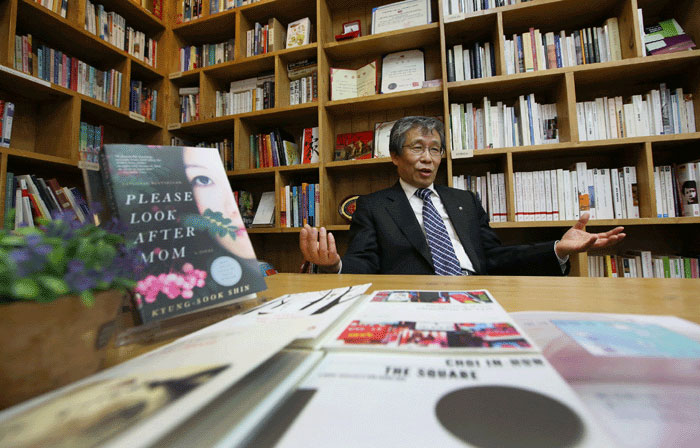
In order for Korean literature to communicate with the world, Kim Seong-kon emphasizes that writers need to destroy boundaries and deal with issues of interest at the world level.
- Please tell us a bit about the way you began the comprehensive information service about Korean literature in translation.
In the past, we only had limited, partial and divided information, and lacked an integrated information service, for which I felt bad. In this regard, the LTI Korea began such a service while developing its e-library. I felt the need to integrate all the information and to bring it all together. For example, we now provide all the related information about a particular author. Recently, the LTI Korea library has been growing a lot and our number of books now exceeds 15,000. Most of them are in the underground library. Books on the first floor are mostly translated books. We have exchanges with many libraries around the world and are quite active at donating our books to them. I think the role of our library is quite important.
- What needs to happen in order for Korean literature to become international and for it to communicate with the world?
To succeed in literature and to penetrate markets around the world, we need three requirements: we need good original works, good translations and good publishers. Good original works should have their own unique fragrance while dealing with universal and worldly issues. The other two must then harmonize with each other. We need someone who is aware of worldwide issues and who writes about them.
For example, "The Name of the Rose" by Umberto Eco, "My Name is Red" by Orhan Pamuk and Dan Brown's "The Da Vinci Code" all have something in common. The authors all wrote historical detective novels and they all have similar themes. In these novels, the authors focused on common issues of interest among all people in the contemporary world: suspect absolute truths of the world, realize other truths hidden by the absolute ones, and accept others. If we were to write such themes with Korean subjects, it would be well-received overseas. In that regard, actually, overseas publishers ask for works that are both useful and fun. They look for stories written in a historical detective style.
In this regard, Yi In-hwa's "The Everlasting Empire" and "Deep-rooted Tree" and "Garden of the Wind" by Lee Jeong-myeong are also good. They all have very good subjects. If Korean literature had such universal subjects, with quality, it would win favorable responses overseas.
- These days, translation seems to be losing its ground as people value practicality and profit. How does translation overcome such circumstances?
From a managerial experts' standpoint, cultural projects are ineffective. It takes a long time and doesn't show many visible outcomes. This is actually a difficulty in the whole field of humanities, including literature and translation. It is hard to apply a managerial mindset to art, culture, literature or translation. They take a long time and don't have many visible features. However, they have very important effects on the world. Sports may have a visible outcome, as you can immediately see the final score. However, I believe that policymakers should be aware that being culturally recognized in the world is also significant.
When Sony and Panasonic became popular around the world, Japanese culture followed. I guess that's the right way for Korea, too. When Samsung, LG and Hyundai took off, the popularity of Korean pop culture across East Asia, the so-called Hallyu effect, followed. This is now being followed by pure literature. The problem is, however, that when Japanese companies penetrated world markets, it was a simpler world. At that time, literature was one of the main sources of knowledge, information and entertainment. Now, however, things have changed. We have a lot of entertainment sources in the world of multimedia and in terms of knowledge and information. Korea seems to face a more difficult situation than Japan did. The number of readers of pure literature has declined. Only a small elite who monitors society continues to read it. Young people don't read physical books. So it feels harder for us. Korean pop music can spread instantly around the world through various channels, like YouTube. Literature, however, cannot. It inevitably goes slowly. Even so, we need to make efforts in various ways. We also need to actively enter the world of e-books.
I wonder whether there is anything that is pure these days. We should not divide the world into "pure" and "not pure," in fact. We should see the big picture of literature. We need to regard literature as a form of cultural text with a broad meaning. We must broaden our scope and keep on with what we have been doing with pure literature. At the same time, we need to support high quality detective novels, science fiction, fantasy and graphic novels, which we used to call comic books, because many children learn history, either Korean or world history, through graphic novels these days. So if we have good graphic novels about Korean history, it would be easier to introduce our history to the world. If we introduce internationally graphic novels about the "Memorabilia of the Three Kingdoms" (Samguk Yusa, 삼국유사, 三國遺事) or about the "History of the Three Kingdoms" (Samguk Sagi, 삼국사기, 三國史記) internationally, children around the world will be able to read and learn about Korean history. We live in a world where we should not have prejudice. For this reason, we plan to expand our targets. This should not be a concern for those of us who work in pure literature. We will support pure literature as usual. In order to broaden the scope and to introduce Korea to the world, however, we hope to support other genres and are beginning to do so now.
- What efforts are you making to achieve this aim?
We have opened everything. When people apply, we will examine their applications and choose what we will support. Graphic novels or genre literature can be targets. We also include books on the humanities and children's books. Collectively, they are all dubbed as "K-books." It used to be "K-literature," but we expanded its scope to become "K-books," which involves all forms of writing.
In fact, video games are to children these days what novels were to our generation. Through video games, kids learn about the world and feel fun, plot twists and adventure. Just as we used to watch "Tarzan" on TV and imagined exploring Africa, children these days experience the same thing when playing video games. For instance, if we have a good video game based on Greek or Roman or Northern European or Korean mythology, it would be worth translating them to introduce them to the world, if they well-represent Korean culture and history, that is. I basically consider literature a game. The comic strip "Misaeng" by Yoon Tae-ho shows how a go game can be good literature. Therefore, we should open our minds to think, "This can be literature," rather than having a prejudice and thinking, "No, this is not literature." If we do so, literature will be much more powerful.
Many authors think that movies ruin literature. Actually, it is quite the opposite. When literature involves film, it creates synergies. The German scholar Joachim Paech once said, "Movies are like a prince who wakes up a sleeping beauty, as it makes literary works which nobody reads come alive and causes people to read them." For me, when I saw the movie "The Name of the Rose," I was so impressed that I looked for the original book and read it.
Another thing is about public opinion which distinguishes between pure and pop literature. I have a different view. This is my idea. Think of "Beauty and the Beast." In the story, a beautiful woman was locked in a magical castle owned by the beast. She was not allowed to go anywhere. Then, she got married to the beast and became a hostess to solve the problem. This story gives us a lesson. "The Beast" is the gigantic, frightful figure of the film, TV and video game industries. "The Trapped Beauty" is pure literature; the belles-lettres, as it were. The beast can be considered a huge industry with magical powers, but the lady has neither power nor money. To solve the situation, they must go hand-in-hand, form a partnership, become friends and love each other. By doing so, she can be the hostess.
In other words, instead of raising up one's voice about a crisis in the humanities or in literature, we need to actively come forward to go hand-in-hand with other media and to cross the boundaries. Then, both literature and society at large can be enriched. Why do we have to be hostile to each other? Now is an era of multimedia. These days, we regard literature as just one more form of media. If literature goes hand-in-hand with other media, it would own everything. I believe people in the cultural sector need to have such an active mindset. They should not lock themselves inside a narrow fence of purity. Edward Wadi Said (1935-2003) said, "All cultures are involved in one another. None is single and pure, all are hybrid, heterogeneous, extraordinarily differentiated and un-monolithic." I agree with him. This also applies to literature. We can write a novel after being impressed by world literature. That book is ours, but the two works are connected.
- People say we haven’t had enough discourse about cultural enrichment. They say there are only slogans, but no concrete picture. What, in your view, will lead us down the road of cultural prosperity?
In order to move forward from "word liquidity" and to achieve something concrete, the humanities need to cross boundaries and get related with other fields, such as science, technology, management, the environment and the ecology. By widening its area, it will mix and converge with everything else, which will lead to cultural enrichment. Thus it will be with literature. There were boundaries in the early 20th century. There was culture for the noble classes and then popular culture. Today, however, we are all the general public. We all watch TV, read magazines and play video games. We live in an era where distinguishing such boundaries is meaningless.
In fact, the relationship between the author and the reader is different from what it was in the past. At that time, the author was in a superior position to teach readers. Today, they are both at the same level. In some cases, readers can even teach the author, too. I believe that going hand-in-hand with other media in this manner is the first basic step to achieve cultural enrichment. It can be achieved by cooperating with other media, forming partnerships and creating something new which literature cannot do it by itself. For example, if we mix literature with video games, we can make a very literary video game.
It is actually pitiful to see. We can find many ways. One of the basic ways is to cross the boundary and to collaborate with other media. For example, in my case, I happened to write essays about movies in the 1990s. When I went to a meeting one day, I told the people about my impression of "Rain Man." I told them that I have a different opinion from most critics who wrote about the film. One of the people there was the head of a publishing firm. He found my story interesting and asked me to write essays for a literary magazine, "Literature's Spirit" ("Munhak Jeongsin"). People loved my essays. I continued to write for the magazine for two years. A collection of my essays was even published a few years later and people loved it. My writings played an important role. Literature went hand in hand with film. I thought we could see culture through film. I mostly analyzed Hollywood movies. As films went hand-in-hand with literature, professors who taught theater and film at Chung-Ang University liked me very much because I made film into a work of art. They thought, "Wow. A Seoul National University professor of English literature has recognized film." This was a different point of view about film, as it considered movies to be good works of art, not just something commercial. This was different from what they used to do with filming technique, such as using a mise-en-scéne or camerawork or the camera's eye. As my essays saw culture through the movies, it gave a lot of power to the movies, which made people regard films as being a high-quality artwork. My book became a bestseller at the time, though no one knows about it anymore. Its title was "Movie Essays by Professor Kim Seong-kon." When literature goes hand-in-hand with film, literature can flourish and both sides will benefit from it.
Scientists are too busy to develop new technologies. So they don't have enough time to consider the ethical side of new technologies or whether the technology is humane or inhumane. Scholars of the humanities or of literature, however, can do that. "The Bicentennial Man" by Issac Asimov (1920-1992) is a good case. This novel involves both literature and technology. In the future, a family buys a cyborg to do house chores. One day, the cyborg grows emotions and intelligence like a human. Later, it leaves the house and becomes independent. It opens its own bank account. It falls in love with the granddaughter of the house and hopes to marry her. As a cyborg, however, it could live for a long time, but it wants to be human. It applied for a residence registration, but got rejected. To be accepted as a human, it changes its inner organs for a human's and in the end gets a transplant of human blood. This results in fatal medical errors, causing the decay of its inner organs, which leads to death. The cyborg, however, does get married to the girl it loved. This movie begs the question, "Who is more humane, the robot or the human?” Machines can be more humane than some humans, who can be worse than animals. This novel was originally written to mark the bi-centennial of the U.S. The author portrayed the cyborg who later becomes independent and leaves the family as the U.S. To live like a man with the wish to marry, the main character gives up his eternal life and chooses to die after living for 200 years. In another movie, "Terminator 2," a machine dies himself for humans. These films tell us that such machines are actually better than humans.
Also, the movie "Multiplicity" deals with various issues that can arise from human cloning. These are all insights into the humanities. Literature can make it fun and interesting to point out the problems of technology. By doing so, I believe we can achieve cultural enrichment. Literature and the humanities can contribute to engineering technology. It makes us think that technology development is not everything. It questions us and makes us think again, like, "Is it really worth it?" and, "How can we use technology in a valuable way?" and, "If humans live like a machine, are they really better than machines?" If authors write novels about such subjects, their books will soon hit the world stage, as they will be easy and fun to read and teach us many things, rather than remaining in the boundaries of so-called pure literature. Then, literature can bring another, better, Renaissance.
- Imagination leads to imagination, one after another, endlessly, relating and connecting each thought and creating something new. Literature has much room for contributing to such great works.
After reading "The Name of the Rose," I thought, "We won't have a better novel than this; no better one, with such a subject." Soon after that, however, Dan Brown came up with "Angels and Demons" and "The Da Vinci Code." Both are great and well-written. I would not consider these books merely pop literature. These books teach us so many things: the history of medieval Europe, the history of art and religion, a discovery that there will be another truth. If books are written in an interesting way and teach us many things, that is good literature. Some works of popular literature make us question, "Why did the author write this? What did the author want to say through this?" Not many people will read such books. We would rather read books that are read interestingly and which give us lessons. That is good literature.
- In that regard, the books of the late Lee Byung-Joo (1921-1992) seem to have all of that: fun, history and philosophy.
We haven't had any writer with such a grand sense of scale since his passing. His novels, like "The Gwan-Bu Ferry Boat" and "The Mountain Jiri" took a view of Korea’s modern history and enlightened us. The subject of his book "Fiction, Alexandria" is based on the city of Alexandria in Egypt but it is about our story. Sometimes, I hope we can have authors on a grand scale like him. It is pitiful. We can write novels with universal themes by using history. Think of Korean history and how many hardships we went through. Even so, we do not seem to fully use such aspects of our history.
- Tell us about some literary works that impressed you as a bookworm.
In fact, I read all the books I could find when I was a kid. I read everything, including comic books and collections of classic literature. However, I didn't like biographies of great people because each individual can become a great person. Or maybe some of them became great just because they were lucky. I preferred comic books and novels, both of which involved the imagination. It is difficult to answer such a question, as I was impressed by so many books. One book I would like to mention, however, is "To Kill a Mocking Bird" by Nelle Harper Lee, which I first read when I was in high school. I saw the movie first, which starred Gregory Peck. I was so moved, I looked for the original. It was also touching. I've read it about five times so far. Whenever I read it, it feels new and makes me cry. I believe this is a good literature because it touches people's hearts, enlightens them and broadens the horizons of our insight.
I like this book because it accuses the prejudices of the grownups' world through the eyes of a child, which is a symbol in all literature. It felt so intense to me. Manuals of English literature introduce this book as a novel that deals with racism in the U.S., but I think this novel is much more complicated than that and it is a masterpiece. Though the issue of racism is laid at the foundation, the book accuses all sorts of prejudices people can have against other people: prejudices of the rich against the poor, prejudices against children from broken homes, which is portrayed with the character Dill, and prejudices against divorced or single women.
The novel is based on U.S. society in the 1930s. At that time, such prejudices existed. Another prejudice the author wrote about is the prejudice adults have against children. When the book was first published in Korea, it was a translation of a Japanese version, which was excellently translated. The title of the book at that time was "Children Know." The title is different from that of the original, but there are reasons for that. The book meant to say that children all know about the weaknesses and prejudices of adults, even though they do not say anything. Adults, however, think children know nothing. The book also points out all kinds of prejudice, including the prejudice people have against those who are considered "abnormal,” prejudices of the West against the East, prejudices that "normal" people have toward "mad" people, which is also related to the theory of Michelle Foucault.
After reading this book, I thought I should never have any prejudices. I made Seoul National University students read this book. They all cried after reading it and realized that they must not have such prejudices. I even showed the movie to them. By doing so, I think literature did a great job. That is good literature. This can be seen as a children's novel or as a popular novel, but I think great literature like this should be put at the top of the ranks of pure literature. The book actually received the Pulitzer Prize. If literature can play such a role, it would be possible to achieve cultural enrichment, wouldn't it? This is because literature deals with social issues, not ideologies of the left or right. If literature can fully handle social issues in a touching way, it can play a remarkable role. Then, both society and culture can prosper together.
- It can be seen that, by thinking about and exchanging human issues through literature, we can contribute to world peace. Do you agree?
Yes. It becomes the basis of everything. When I was lecturing at a university in the U.S., I was asked, "What is literature?" My answer is that, "Literature, in the case of novels, teaches us about how to live a life in the most valuable manner by featuring many characters." This is because we think, "We should live or not live like this person," when reading a novel. Novels teach us about why conflicts arise between people and how we can solve them. By going through such procedures, novels enlighten us as to how to live a life in a humane manner. Literature teaches us how we should live our future through our history. In science fiction, it informs us how we should live our lives in the future through science. In fantasy, it makes us realize how to live our present by reflecting on the mirror of the fantasy world. I believe this is the basic function of literature.
- Can you choose three books of Korean literature that you wish to introduce to readers from around the globe, and tell us why?
Personally, I like the works of Yi Sang (1910-1937), which include "The Wings." I majored in Postmodernism. His works went way ahead of his time, even before Postmodernism came to Korea. His books allow many interpretations and various aspects. Literary works need to be interpreted in many ways, not just sticking to one view. That is what "The Wings" does. For instance, the main character can be seen as a helpless intellectual in the era of Japanese colonization. His wife, a prostitute, can be seen as Korea while her clients can be seen as Japan.
I wish to introduce Korean literature by categorizing it by era. There is classical literature, literature from colonial times, the literature of industrialization -- which also includes literature from under the military dictatorship -- and then literature from the era of IT.
The era of IT can be represented by the works of Kim Young-ha, Lee Kiho, Cheon Myeong-kwan and Park Min-gyu who deal with the new sensitivity of young people.
Authors who stand for the era of industrialization are Kim Seung-ok, who wrote "Seoul, Winter 1964" and "Trip to Mujin," Cho Se-hui, who wrote “The Dwarf,” and then "The Man Left With Nine Pairs of Shoes" by Yun Heunggil. They all dealt well with the issues of their time.
Authors from colonial times can be represented by Yi Sang, Kim Dongin, Lee Hyoseok and Yeom Sang-seop. Among them, I think Lee Hyoseok is also one of the writers who most resisted reality. He never meant to say that we should simply live our lives by following Naturalism. Authors at that time displayed resistance in various manners. Lee did the same in a unique way. In comparison, it can be seen that Yeom resisted in a more direct manner.
Many non-Korean readers love the translations of classical Korean literature. In cooperation with the Korea Herald, the LTI Korea published five translations of classical Korean literature, which were really popular. By doing so, classical literature became easier and more interesting to read. Non-Koreans love classical Korean literature, like "Yangbanjeon" by Yeonam Park Jiwon (1737-1805), as long as we add an explanation about the background of the book. These explanations tell non-Koreans why such satirical works were made during those times, what it satired and about what the era and society were like at that time.
If we produce such series of books, non-Korean readers can have a good grasp of Korean literature by era, as the books well-portray the phases of the times. This is because literature takes a good view of the times in which it is written. Readers can learn about the way in which people lived in a certain era and what issues they agonized with from the rip currents of society. By doing so, they can guess the direction of people today. In this regard, I think it would be good to make a collection of literary works that enable us to have a glance at our past by era.
This also applies to film. When "My Sassy Girl" was released in the early 2000s, people said the movie well-portrayed an image of women who became stronger, which made it more appealing. For this reason, people say we should watch such movies to learn about society during those times.
- On the contrary, what three works of non-Korean literature would you like to recommend to Korean readers, and why?
Actually, I have too many in mind, but one work I would like to recommend is the short story "The Crying of Lot 49" by Thomas Pynchon. This novel is based on the U.S. of the 1950s and 1960s. The author wrote the book by comparing in a touching way issues that Korea has been facing with issues the U.S. has been facing. At that time, the U.S. was led by the conservatism of the 1950s and by the progressivism of the 1960s. The writer wrote about the conflict between the two, which lasted for two decades, and its solutions were quite desperate. When we read this book, we will learn from history by realizing that, "We should not live like this," or that, "We should live like this."
The novel makes us open our hearts and teaches us to learn from history to avoid making the same mistakes. Aren't we fools to experience the same thing, which another country has experienced before? The most pitiful and desperate thing is the fact that we should stop ideological conflict. Writers should be the first ones to make efforts to make Korean literature globalized across the world. That is the way to promote Korean literature around the world. We should move forward in that way. We should stop fighting, confronting and antagonizing. We would better reconcile with each other because writing itself is a political act for authors.
- What are the future plans of the LTI Korea?
We plan to establish a trilateral translation organization led by Korea, China and Japan within the year. This could also involve Southeast Asian countries. These three countries will then publish books together in the U.S. and the U.K. By doing so, we will receive more attention and our works will be considered and dealt with more seriously.
- What does translation mean to you?
I began my career as an English literature scholar and loved Korean literature. The first goal as an English literature scholar is to become an expert in English literature and in the cultures of the U.S. and the U.K. However, I thought that I should not stop at that point. I would rather cross the boundary and reflect on Korean literature in English literature, in order to contribute to globalizing Korean literature around the world. I considered this as the ultimate goal of a scholar of literature of a foreign country.
To do so, translation is an essential part of the process. I have had many titles, such as English literature scholar, literary critic, magazine publisher and the head of Seoul National University Press and the Association of Korean University Presses. My favorite title, however, is "literature translator" because I see that everything involves translation as part of the process. Even in the relationship between individuals or the dialogue among family members, translation enables communication. This can also be seen in the difference between a man's language and that of a woman, or the difference between the language of grownups and of children. Every process can be seen as translation. Translation is not separate. It rather comes along with our lives. I regard translation as being very important work that goes alongside literature. I have received many awards, but among them, the happiest moment for me was when I was selected as the most representative translator of Korea by the Publishing Journal of the Korean Publishers Association. That is what I wanted to do: introduce Korean literature overseas by translating is truly a rewarding job. For that job, translation is essential.
Article by Wi Tack-whan, Yoon Soung
Photos: Jeon Han
Korea.net Staff Writers
whan23@korea.kr
To know more about LTI Korea, visit its homepage:
http://www.klti.or.kr/main.do
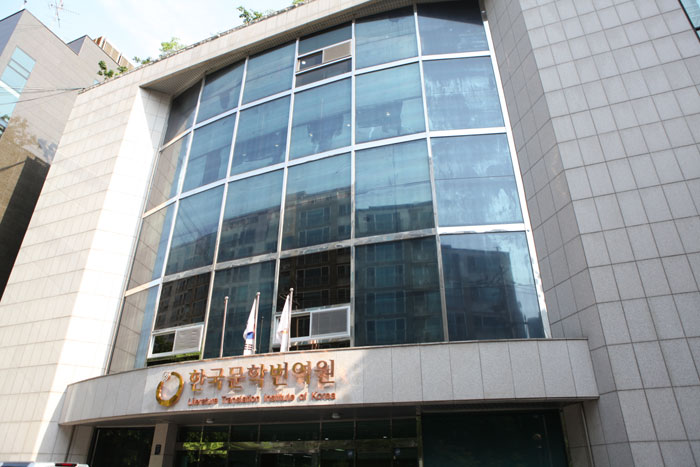
The LTI Korea was established in 2001 to introduce Korean literature and culture to the world. The above photo shows LTI Korea headquarters.
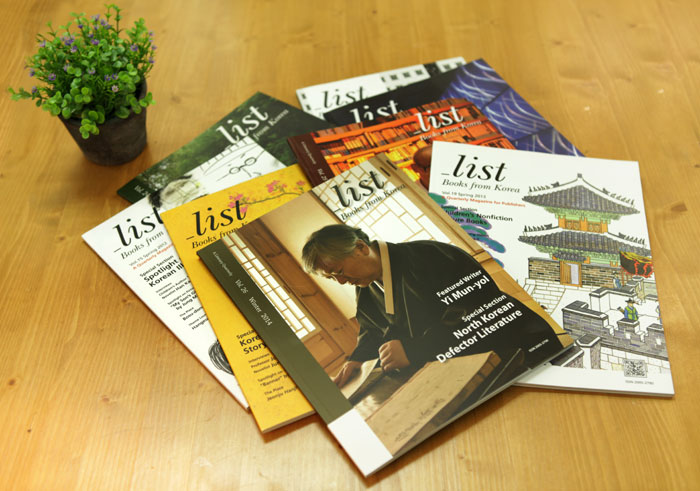
To raise interest in Korean literature and to introduce Korea authors overseas, the LTI Korea produces various publications, including a quarterly magazine 'list.'
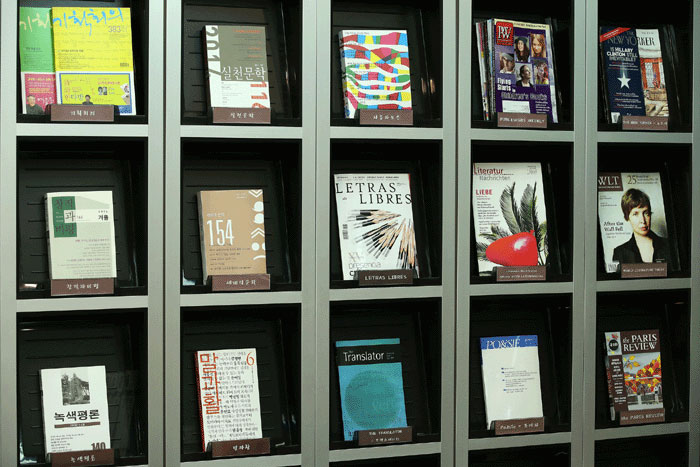
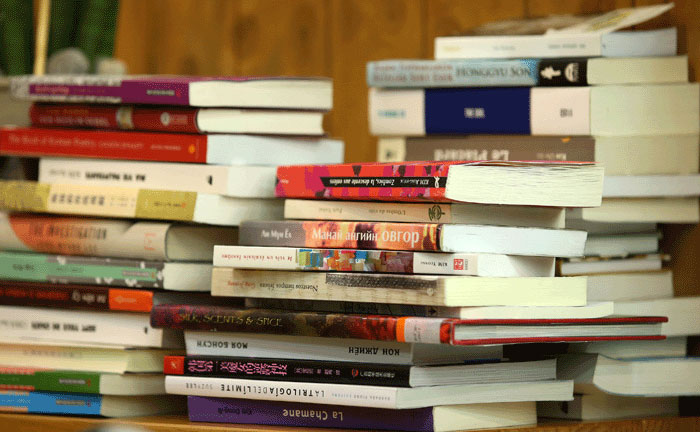

Reflecting current trends toward consuming a diverse range of media, the LTI Korea developed an app which allows users to read Korean literature through their smartphone. It also published 30 e-books. The above photos show the LTI Korea library.
